Cats are known for their independent nature, making them generally easier to leave alone compared to dogs. However, just because cats seem self-sufficient doesn’t mean they don’t need care, attention, and proper planning when you leave them at home. Whether you’re heading to work, taking a day trip, or planning a longer vacation, it’s essential to ensure that your feline friend is safe, comfortable, and well cared for in your absence.
We explore how long you can leave a cat alone and provide expert tips and advice to help you prepare your home and cat for solo time.
How Long Can You Leave a Cat Alone?
While cats are relatively independent creatures, there are limits to how long they can be left alone. Several factors influence how long it’s appropriate to leave your cat without supervision, including their age, health, and temperament.
Kittens (Up to 6 months)
Kittens require much more care and attention than adult cats. They are still developing, need frequent feeding, and can get into trouble if left unsupervised for too long. It’s generally recommended that kittens not be left alone for more than 4-6 hours at a time. If you need to leave them for longer, consider having someone check in on them or hiring a pet sitter.
Adult Cats (6 months and older)
Healthy adult cats can usually be left alone for 24-48 hours as long as their basic needs are met. These include access to fresh water, enough food, a clean litter box, and environmental enrichment (toys, scratching posts, etc.) to keep them mentally stimulated. However, it’s important to consider your cat’s personality—some cats may experience anxiety or become bored when left alone for extended periods.
Senior Cats (10 years and older)
Older cats may require more attention and care due to health issues or decreased mobility. Senior cats may also need more frequent meals and bathroom breaks. It’s best to limit their alone time to 24 hours or less, and always ensure they have easy access to water, food, and their litter box.
Cats with Special Needs
If your cat has health problems or requires medication, it’s essential to limit how long they are left alone. Cats with diabetes, kidney disease, or other medical conditions may need frequent check-ins or medication administration. In such cases, it’s advisable not to leave them alone for more than 12 hours, and you may need to arrange for a pet sitter or a trusted friend to check on them.
Essential Tips for Leaving Your Cat Alone
Now that you know how long you can safely leave your cat alone, here are some essential tips to ensure their safety and comfort during your absence.
Provide Enough Food and Water
Ensuring your cat has access to fresh food and water is the most critical aspect of leaving them alone. Here’s how to keep them well-fed and hydrated while you’re away:
- Automatic Feeders: If you’re leaving for more than a day, consider using an automatic feeder that dispenses food at set intervals. This ensures your cat gets regular meals even when you’re not home.
- Water Fountains: Cats tend to drink more from running water, so a water fountain can be an excellent way to keep them hydrated. Make sure the fountain is full before you leave, and if you’re gone for a longer period, consider setting up multiple water stations around the house.
Ensure a Clean Litter Box
Cats are fastidious creatures, and they prefer using a clean litter box. If you’re leaving for 24-48 hours, it’s essential to clean their litter box before you go. For longer absences, consider:
- Self-Cleaning Litter Boxes: These automated boxes scoop waste into a compartment after your cat uses the box, ensuring a clean space even while you’re away.
- Multiple Litter Boxes: If you don’t have a self-cleaning litter box, place extra litter boxes around your home, especially if you plan to be gone for more than a day.
Keep Your Cat Entertained
Boredom can lead to destructive behaviour or anxiety in cats, especially if they’re left alone for an extended period. To keep your cat mentally stimulated:
- Interactive Toys: Provide a variety of toys, such as puzzle feeders, balls, or toys filled with catnip. These will keep your cat engaged and entertained.
- Scratching Posts and Climbing Trees: Cats love to scratch and climb, so make sure they have access to scratching posts and a cat tree. This also gives them exercise and helps prevent boredom.
- Window Views: Cats enjoy watching the outside world. Position a perch or cat bed near a window where they can watch birds, squirrels, or other outdoor activity.
Cat-Proof Your Home
Before leaving your cat alone, ensure your home is a safe environment. Here are some things to consider:
- Remove Hazardous Items: Cats are curious by nature and may get into things they shouldn’t. Put away items like cleaning products, sharp objects, and small items that could be swallowed.
- Secure Windows and Doors: Ensure all windows and doors are securely closed and block off any areas of the house where your cat might get stuck or injured.
- Cords and Wires: Cats love to play with dangling objects, so secure any electrical cords or blinds strings that could pose a choking hazard.
Consider a Pet Sitter or Cat Boarding
If you’re going to be away for more than 48 hours, it’s recommended to arrange for someone to check in on your cat or even hire a pet sitter. A pet sitter can provide your cat with companionship, clean the litter box, feed them, and monitor their overall well-being.
Alternatively, some cat owners choose to board their cats at a reputable pet boarding facility. This ensures your cat is in a safe, supervised environment, but it may be stressful for cats who prefer the familiarity of their own home.
Monitor Your Cat Remotely
If you’re worried about your cat while you’re away, consider using a pet camera. These cameras allow you to check in on your cat remotely through your smartphone. Some models even have two-way audio, so you can talk to your cat and hear them meow back!
Create a Calm and Comfortable Environment
Before you leave, make sure your cat’s environment is calm and comfortable. Leave your cat’s favourite blankets, toys, and beds in their usual spots. You can also use pheromone diffusers, to create a soothing atmosphere that helps reduce anxiety.

When Not to Leave Your Cat Alone
There are some situations where it may not be safe or advisable to leave your cat alone for extended periods:
- Health Issues: If your cat is recovering from surgery, has a medical condition, or is showing signs of illness, it’s best to have someone monitor them regularly.
- Extreme Weather: If your home is prone to power outages or extreme temperatures, it’s safer to have someone check on your cat to ensure they are comfortable and safe.
- Recent Changes: If there has been a significant change in your cat’s life, such as moving to a new home or introducing a new pet, they may require more attention and shouldn’t be left alone for long periods.
While cats are independent animals, they still require care, attention, and proper preparation when left home alone. Understanding how long you can leave a cat alone and following the tips outlined above will help ensure your cat remains safe, comfortable, and content in your absence.
















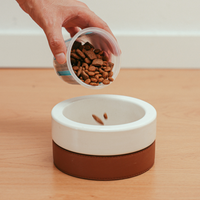





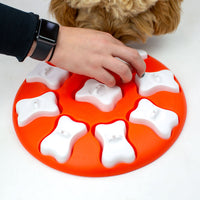











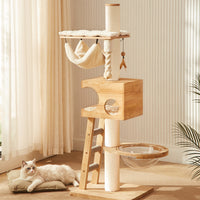




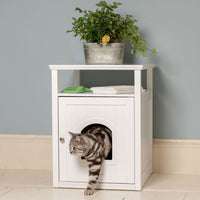

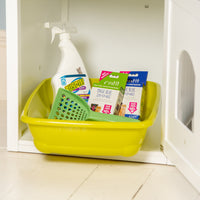


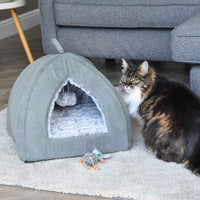








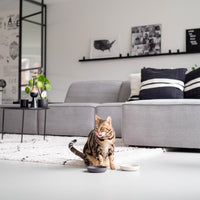
.jpg?v=1725444478725&options=)








































